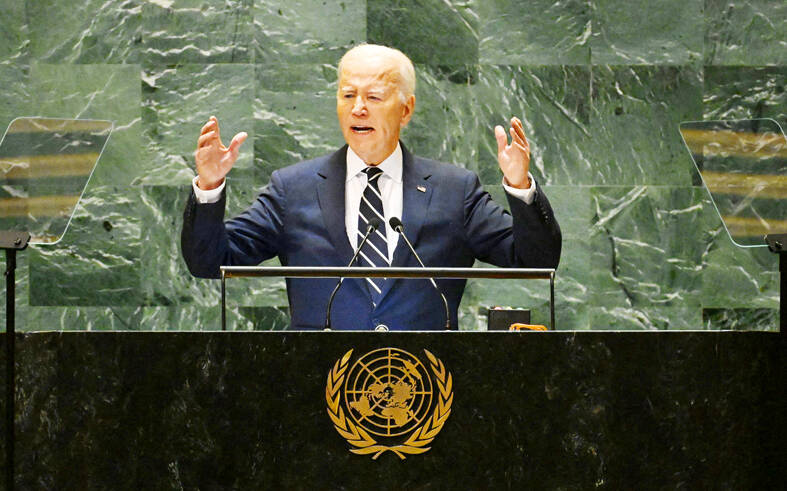The Ministry of Foreign Affairs (MOFA) yesterday thanked US President Joe Biden for his remarks about the importance of peace and stability in the Taiwan Strait in his UN speech.
Biden delivered the speech, his final address to the UN as US president, at the 79th Session of the UN General Assembly in New York, emphasizing US support for stability in the Strait, condemning military aggression in the South China Sea and committing to deepening security cooperation in the Indo-Pacific region.
Biden said the US is “unabashed” in its pursuit of its goals, including protecting its lead in advanced technologies.

Photo: AFP
“At the same time, we’re going to continue to strengthen our network of alliances and partnerships across the Indo-Pacific,” Biden said. “These partnerships are not against any nation. They are building blocks for a free, open, secure, and peaceful Indo-Pacific.”
Biden’s remarks came after several days of meetings between US officials and representatives of major allies, including a Quadrilateral Security Dialogue (Quad) leaders’ summit, meetings between G7 foreign ministers, a trilateral discussion between the US, Japan and South Korea, and US-Australia talks.
The G7 foreign ministers’ statement on Tuesday said the group supports “Taiwan’s meaningful participation in international organizations as a member where statehood is not a prerequisite and as an observer or guest where it is.”
The group reaffirmed that “maintaining peace and stability across the Taiwan Strait is indispensable to international security and prosperity,” and called for “the peaceful resolution of cross-strait issues.”
There “is no change in the basic position of the G7 members on Taiwan, including stated ‘one China’ policies,” the statement said.
MOFA thanked the countries for their support and emphasized that Taiwan would continue to work with the US and other like-minded nations to safeguard peace, stability and prosperity in the Taiwan Strait and the region.
After Monday’s trilateral meeting between the US, Japan and South Korea, the countries in a statement said that “peace and stability across the Taiwan Strait is an indispensable element of security and prosperity in the international community.”
Although Taiwan was not mentioned by name in the annual Quad Leaders’ Summit’s joint statement, the group, which is made up of the US, Australia, India and Japan, called for “maintenance of peace, safety, security and stability” in the Indo-Pacific region.
Biden and Australian Prime Minister Anthony Albanese after their meeting on Friday last week said that they discussed maintaining peace in the Taiwan Strait, as they expressed their concerns regarding China’s “coercive and destabilizing” activities.

CHAOS: Iranians took to the streets playing celebratory music after reports of Khamenei’s death on Saturday, while mourners also gathered in Tehran yesterday Iranian Supreme Leader Ayatollah Ali Khamenei was killed in a major attack on Iran launched by Israel and the US, throwing the future of the Islamic republic into doubt and raising the risk of regional instability. Iranian state television and the state-run IRNA news agency announced the 86-year-old’s death early yesterday. US President Donald Trump said it gave Iranians their “greatest chance” to “take back” their country. The announcements came after a joint US and Israeli aerial bombardment that targeted Iranian military and governmental sites. Trump said the “heavy and pinpoint bombing” would continue through the week or as long

TRUST: The KMT said it respected the US’ timing and considerations, and hoped it would continue to honor its commitments to helping Taiwan bolster its defenses and deterrence US President Donald Trump is delaying a multibillion-dollar arms sale to Taiwan to ensure his visit to Beijing is successful, a New York Times report said. The weapons sales package has stalled in the US Department of State, the report said, citing US officials it did not identify. The White House has told agencies not to push forward ahead of Trump’s meeting with Chinese President Xi Jinping (習近平), it said. The two last month held a phone call to discuss trade and geopolitical flashpoints ahead of the summit. Xi raised the Taiwan issue and urged the US to handle arms sales to

BIG SPENDERS: Foreign investors bought the most Taiwan equities since 2005, signaling confidence that an AI boom would continue to benefit chipmakers Taiwan Semiconductor Manufacturing Co’s (TSMC, 台積電) market capitalization swelled to US$2 trillion for the first time following a 4.25 percent rally in its American depositary receipts (ADR) overnight, putting the world’s biggest contract chipmaker sixth on the list of the world’s biggest companies by market capitalization, just behind Amazon.com Inc. The site CompaniesMarketcap.com ranked TSMC ahead of Saudi Aramco and Meta Platforms Inc. The Taiwanese company’s ADRs on Tuesday surged to US$385.75 on the New York Stock Exchange, as strong demand for artificial intelligence (AI) applications led to chip supply constraints and boost revenue growth to record-breaking levels. Each TSMC ADR represents

Pro-democracy media tycoon Jimmy Lai’s (黎智英) fraud conviction and prison sentence were yesterday overturned by a Hong Kong court, in a surprise legal decision that comes soon after Lai was jailed for 20 years on a separate national security charge. Judges Jeremy Poon (潘兆初), Anthea Pang (彭寶琴) and Derek Pang (彭偉昌) said in the judgement that they allowed the appeal from Lai, and another defendant in the case, to proceed, as a lower court judge had “erred.” “The Court of Appeal gave them leave to appeal against their conviction, allowed their appeals, quashed the convictions and set aside the sentences,” the judges